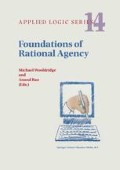Abstract
Agents are entities that act upon the world. Rational agents are those that do so in an intelligent fashion. What is essential to such an agent is the ability to select and perform actions. Actions are selected by planning, and performing such actions is a matter of plan execution. So the essence of a rational agent is the ability to make and execute plans. This constitutes practical cognition. In order to perform its principal function of practical cognition, a rational agent must also be able to acquire the knowledge of the world that is required for making and executing plans. This is done by epistemic cognition. Rational agents embedded in a realistically complicated world (e.g., human beings) may devote more time to epistemic cognition than to practical cognition, but even for such agents, epistemic cognition is in an important sense subservient to practical cognition.
Access this chapter
Tax calculation will be finalised at checkout
Purchases are for personal use only
Preview
Unable to display preview. Download preview PDF.
References
Michael Beetz and Drew McDermott. Local planning of ongoing activities. In Brian Drabble, editor, Proceedings of the Third International Conference on Artificial Intelligence Planning Systems. AAAI Press, 1996.
M. Bratman, D. Isreal, and M. Pollack. Plans and resource-bounded practical reasoning. Computational Intelligence, 4: 349–355, 1988.
R. E. Fikes and N. J. Nilsson. Strips: a new approach to the application of theorem proving to problem solving. Artificial Intelligence, 2: 189–208, 1971.
Michael Gelfond and Vladimir Lifschitz. Representing action and change by logic programs. Journal of Logic Programming, 17: 301–322, 1993.
Michael Georgeff and Amy Lansky. Reactive reasoning and planning. In Proceedings AMI-87, pages 677–682, 1987.
C. Green. Application of theorem-proving to problem solving. In Proceedings IJCAI-69, pages 219–239, 1969.
Steve Hanks and Drew McDermott. Default reasoning, nonmonotonic logics, and the frame problem. AAAI-86, 1986.
David Lewis. Counterfactuals. Harvard University Press, Cambrdige, Mass, 1973.
Fangzhen Lin and Raymond Reiter. How to progress a database (and why) i. logical foundations. In Proceedings of the Fourth International Conference on Principles of Knowledge Representation (KR94), pages 425–436, 1994.
Fangzhen Lin and Raymond Reiter. How to progress a database ii: The strips connection. IJCAI-95, pages 2001–2007, 1995.
David McAllester and David Rosenblitt. Systematic nonlinear planning. In Proceedings ofAAAI91, pages 634–639, 1991.
John McCarthy. Epistemological problems in artificial intelligence. In Proceedings IJCA-77, 1977.
J. Scott Penberthy and Daniel Weld. Ucpop: a sound, complete, partial order planner for adl. In Proceedings 3rd International Conference on Principles of Knowledge Representation and Reasoning, pages 103–114, 1992.
John Pollock. The Foundations of Philosophical Semantics. Princeton University Press, 1984.
John Pollock. Contemporary Theories of Knowledge. Rowman and Littlefield, 1987.
John Pollock. Oscar: a general theory of rationality. Journal of Experimental and Theoretical AI, 1: 209–226, 1990.
John Pollock. New foundations for practical reasoning. Minds and Machines, 2: 113–144, 1992.
John Pollock. Cognitive Carpentry. MIT Press, 1995.
John Pollock. Perceiving and reasoning about a changing world. technical report of the oscar project., 1996. This can be downloaded from http://www.u.arizona.edu/~pollock/.
John Pollock. Reason in a changing world. In Dov M. Gabbay and Hans Jürgen Ohlbach, editors, Practical Reasoning: Internaltional Conference on Formal and Applied Practical Reasoning, pages 495–509, 1996.
E. D. Sacerdotti. The non-linear nature of plans. In Proceedings IJCAI-75, 1975.
E. D. Sacerdotti. A Structure of Plans and Behavior. Elsevier-North Holland, Amsterdam, 1977.
Murray Shanahan. Robotics and the common sense informatic situation. In Proceedings of the 12th European Conference on Artificial Intelligence. John Wiley & Sons, 1996.
Yoav Shoham. Reasoning about Change. MIT Press, 1987.
Manuela Veloso, Jaime Carbonell, Alicia Perez, Daniel Borrajo, Eugene Fink, and Jim Blythe. Integratin planning and learning: the prodigy architecture. Journal of Experimental and Theoretical Artificial Intelligence, 7, 1995.
S. Vere and T. Bickmore. A basic agent. Computational Intelligence, 6: 41–60, 1990.
Daniel Weld. An introduction to least commitment planning. Al Magazine, 15: 27–62, 1994.
M. Wooldridge and N. R. Jennings. Intelligent agents: theory and practice. The Knowledge Engineering Review, 10:115–152, 1995.
Author information
Authors and Affiliations
Editor information
Editors and Affiliations
Rights and permissions
Copyright information
© 1999 Springer Science+Business Media Dordrecht
About this chapter
Cite this chapter
Pollock, J.L. (1999). Planning Agents. In: Wooldridge, M., Rao, A. (eds) Foundations of Rational Agency. Applied Logic Series, vol 14. Springer, Dordrecht. https://doi.org/10.1007/978-94-015-9204-8_4
Download citation
DOI: https://doi.org/10.1007/978-94-015-9204-8_4
Publisher Name: Springer, Dordrecht
Print ISBN: 978-90-481-5177-6
Online ISBN: 978-94-015-9204-8
eBook Packages: Springer Book Archive

